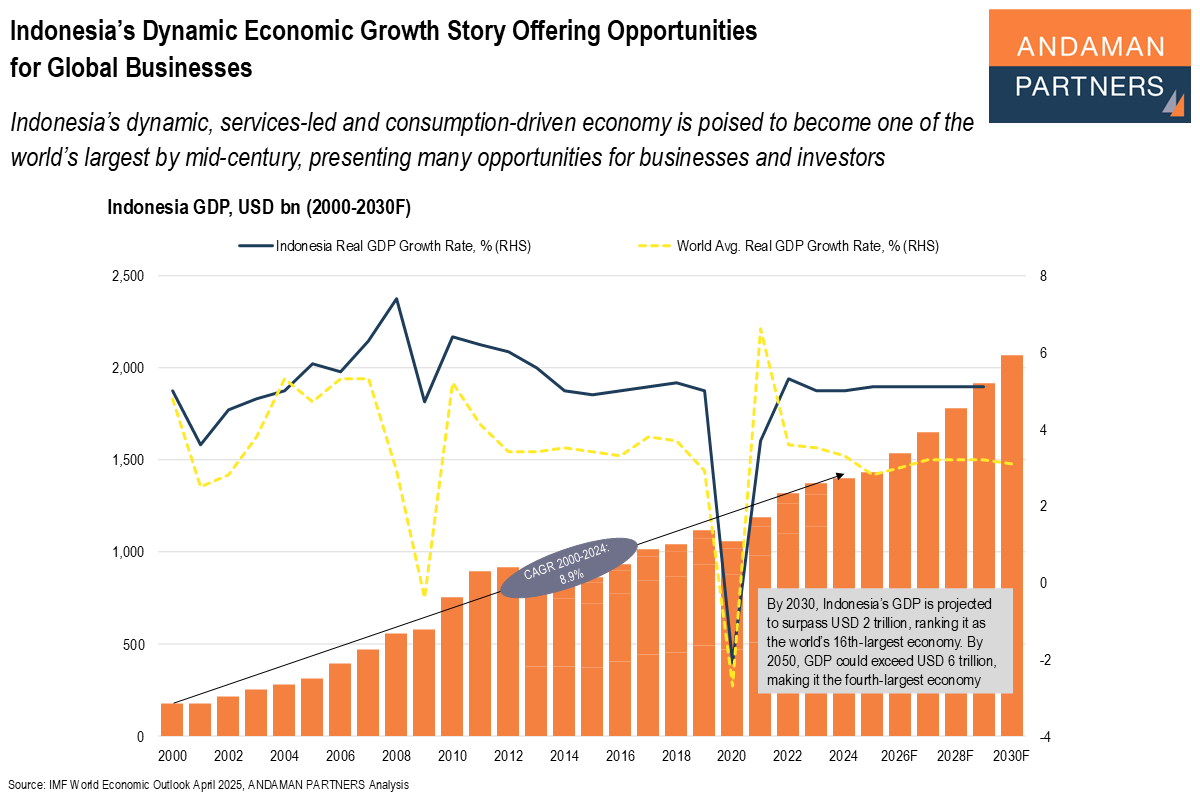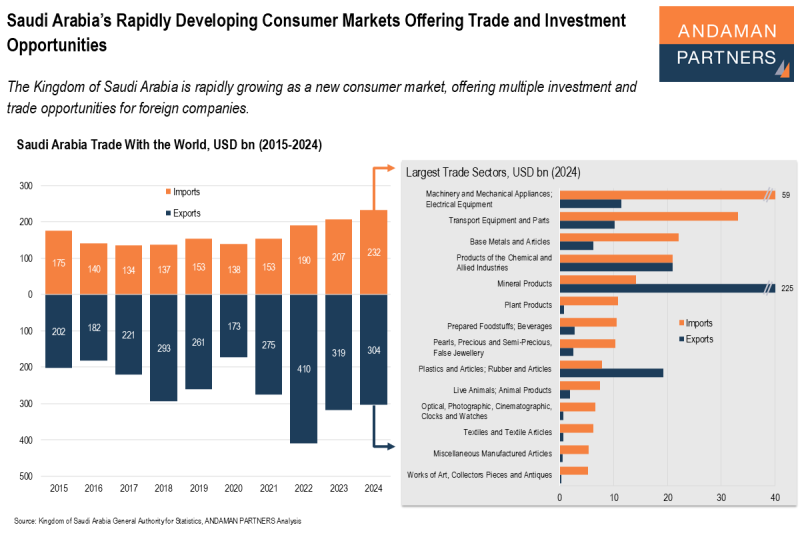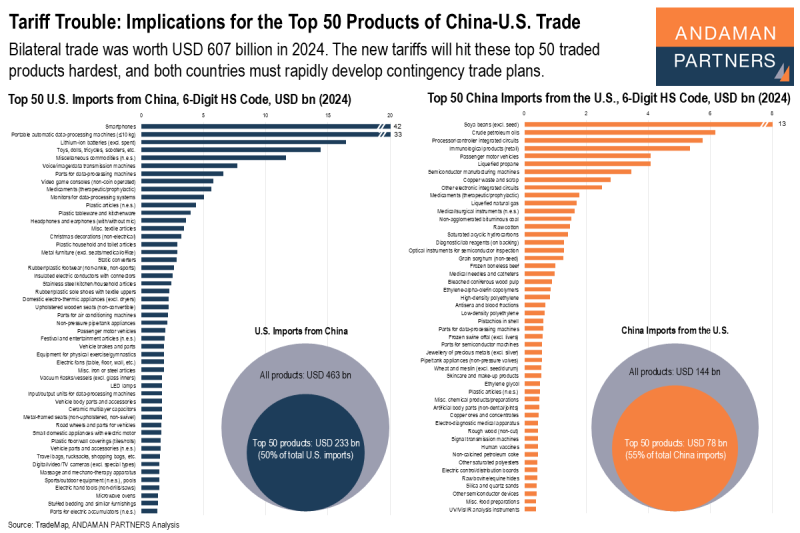Indonesia’s dynamic, services-led and consumption-driven economy is poised to become one of the world’s largest by mid-century, presenting multiple opportunities for global businesses.
From under USD 180 billion in 2000 to USD 1.42 trillion in 2024, Indonesia’s economy has grown rapidly, averaging around 9% annual growth over the past two decades. With a population exceeding 277 million in 2023, 70% of whom are under the age of 40, Indonesia’s economic prospects are bright.
By 2030, GDP is projected to surpass USD 2 trillion, ranking it as the world’s 16th-largest economy. By 2050, it could exceed USD 6 trillion, positioning Indonesia fourth globally, behind only China, the U.S. and India.
The services sector is the largest contributor to GDP, accounting for approximately 43% of the total in 2023. The shares of agriculture (13%) and manufacturing (19%) have gradually declined over the past two decades. High-value service industries, including logistics, healthcare and tourism, are thriving.

Although its share of GDP has declined since the 2000s, final consumption expenditure remains the cornerstone of Indonesia’s economy, contributing 62% to GDP in 2023, higher than China’s 55.6%. At the same time, gross fixed capital formation rose to 29% in 2023, mainly driven by infrastructure development and public-sector investment.
The contribution of net exports to GDP has declined over time, standing at just 2.2% in 2023. Total exports in 2024 reached USD 265 billion, dominated by minerals, fuels, and chemicals. However, Indonesia is diversifying from traditional commodities like coal, palm oil, rubber and raw nickel ore toward processed nickel, machinery, and electronics.
The exports-to-GDP ratio fell from 34.6% in 2000 to a low of 14.9% in 2019, stabilising at 18.9% in 2024. This trajectory underscores Indonesia’s transition from an export-reliant economy to one increasingly powered by domestic consumption and value-added services.
Guidelines for Businesses Seeking to Partake in Indonesia’s Growth Story
Businesses seeking to be part of Indonesia’s growth story must take note of the following key considerations:
- Focus on investments in high-growth areas: Indonesia offers significant potential in its services sector and rapidly expanding industrial base. Companies looking to invest should focus on high-growth areas such as digital services, manufacturing and sustainable industries.
- Form strategic partnerships: With rising exports in key sectors and a growing middle class, strategic partnerships will be key to long-term profitability in this dynamic and evolving market, especially for operating effectively in large domestic markets.
- Get your focus right and know what to avoid: Carefully review Indonesia’s regulatory environment, taking note of priority sectors for foreign investment (e.g., technology, e-commerce, tourism) and the Negative Investment List of sectors restricted or closed to foreign investment (e.g., certain types of mining, agriculture and defense industries).
- Hire locally and leverage government incentives: Hiring and training Indonesians complies with local employment laws and will provide domestic market insights. Seek out government incentives for foreign investors, particularly in priority sectors.
- Be highly adept at cultural sensitivity: Cultural sensitivity is crucial for ensuring successful operations in Indonesia. This includes respect for authority, personal relationships, patient negotiating tactics and religious sensitivity.
ANDAMAN PARTNERS supports international business ventures and growth. We help launch global initiatives and accelerate successful expansion across borders. If your business, operations or project requires cross-border support, contact connect@andamanpartners.com.

ANDAMAN PARTNERS Was a Co-Sponsor of the South African National Day Reception in Shanghai on 30 May 2025
ANDAMAN PARTNERS was a cosponsor of the South African National Day Reception in Shanghai on 30 May 2025.
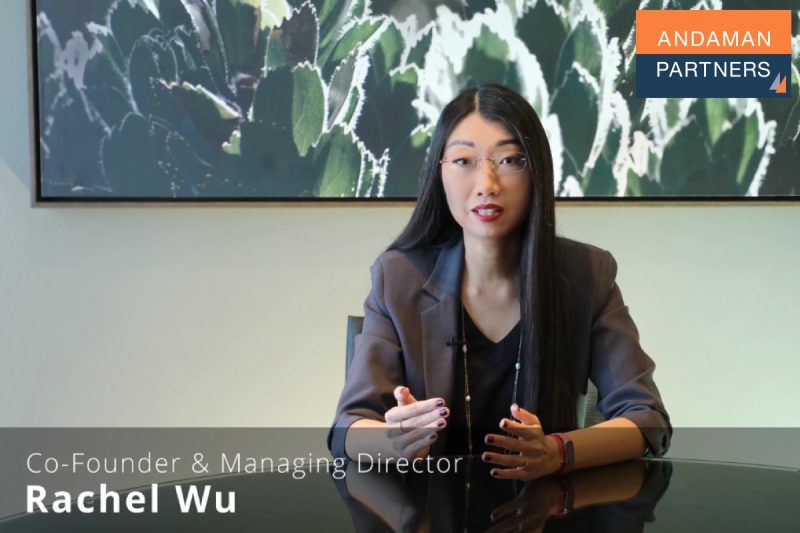
Asia’s Shifting Role in Global Supply Chains — Perspectives by ANDAMAN PARTNERS Co-Founder Rachel Wu
Analysis by ANDAMAN PARTNERS Co-Founder Rachel Wu on changing patterns in global supply chains.

ANDAMAN PARTNERS Co-sponsored the West Australian Mining Club Luncheon in Perth on 27 February 2025
WA Mining Club luncheons are valuable ways to network with colleagues and clients and learn about the latest industry insights.
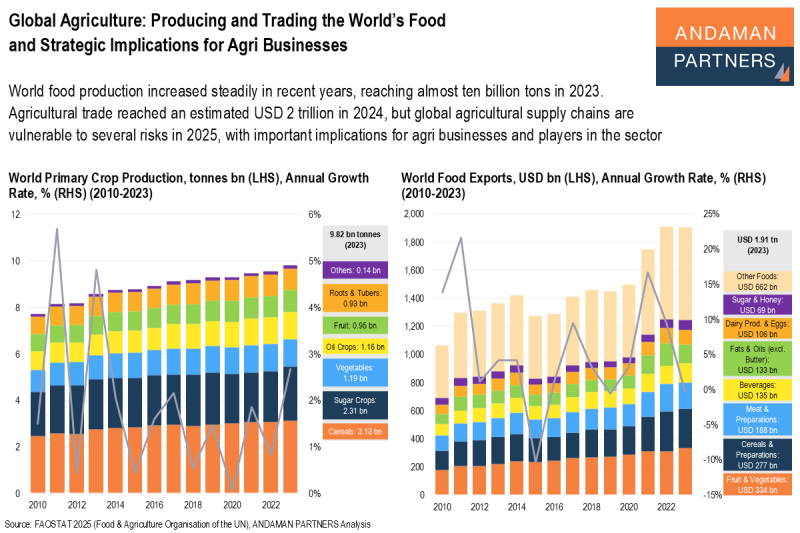
Global Agriculture: Producing and Trading the World’s Food and Strategic Implications for Agri Businesses
Global agricultural supply chains are vulnerable to several risks in 2025, with important implications for agri businesses and players in the sector.

Southeast Asia: The USD 4-trillion Economy
With rapid GDP growth, expanding trade networks and investment inflows, Southeast Asia retains its enduring appeal as a vital destination for multinational corporations seeking to diversify their supply chains and tap into Asia’s growing consumer markets.

Indonesia’s Dynamic Economic Growth Story Offering Opportunities for Global Businesses
Indonesia’s dynamic, services-led and consumption-driven economy is poised to become one of the world’s largest by mid-century, presenting many opportunities for businesses and investors.

